Recruiting isn’t only about résumés anymore; it is about data, algorithms, and smart decision-making. As job applications surge, and the need to attract top talent promptly grows, traditional approaches are falling short. This is where Artificial Intelligence comes into play and disrupts the recruiter–candidate game.
Almost 88% of companies are now incorporating AI into their initial candidate screening process, according to the World Economic Forum (WEF). And it’s not just a question of efficiency, it’s about better results. In addition, WEF notes that candidates pre-selected by AI to be interviewed by humans had a 53.12% success rate compared with 28.57% for candidates who had been randomly selected by the AI.
From AI-driven chatbots and automated assessments to predictive analytics identifying top performers, AI is helping businesses to standardise hiring practices while improving the candidate experience.
In this blog, we’ll discuss the way AI is shaping recruiting today, the practical advantages of AI, along with the factors HR and talent leaders should weigh before getting started.
Recent Trends of AI In Recruiting
Artificial intelligence is already changing the way companies do the work of finding, hiring, and onboarding talent. From removing the manual from mundane chores to ensuring the hiring process is both more inclusive and skills-driven, today’s recruitment tactics are more data-driven and automated than ever. Below are the primary AI-driven trends restructuring recruitment in 2025:
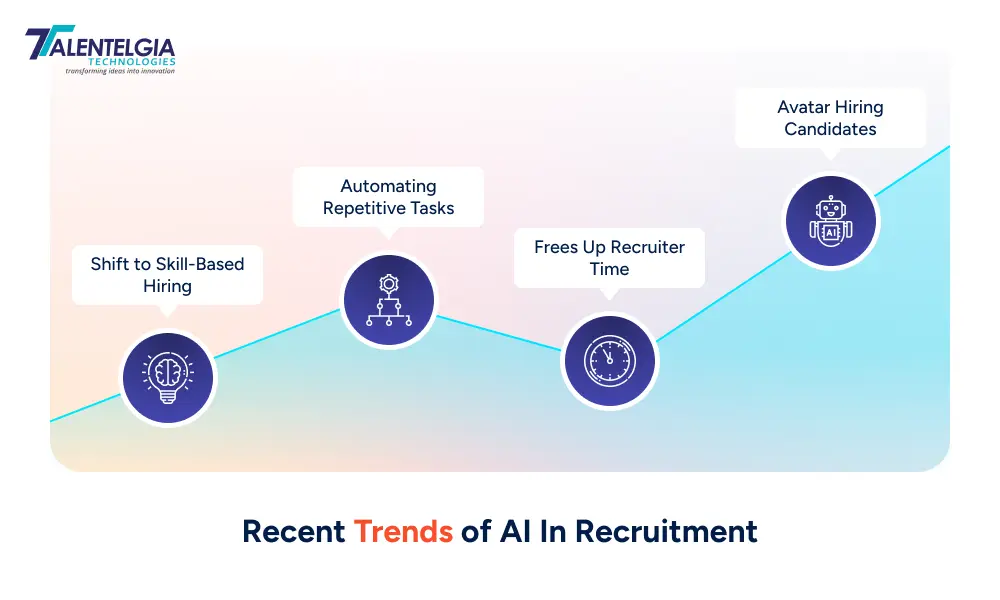
1. Shift To Skill-Based Hiring
A degree or qualification is diminishing in value. The NACE Job Outlook 2024 reports that less than 40% of employers use educational qualifications as a main tool for eliminating prospective job candidates, which is a huge leap towards skills-based hiring.
So, what’s fueling this transformation? Today, cutting-edge hiring platforms use AI-driven skills assessments and job matching software to consider candidates based on actual, role-specific skills, not pure academic achievements or job titles.
Why AI-Driven Skills-Based Hiring Matters?
As the workplace changes, so must hiring strategies. Here is why this AI recruiting trend is not just buzzword-worthy:
- Fairer and More Accurate Hiring
AI rates candidates based on what they know how to do, not just what’s listed on a diploma. This minimizes unconscious bias, evens the playing field, and enhances job-to-candidate fit.
- Access to a Wider Talent Pool
Skills-first hiring accommodates career switchers, self-taught people, and non-traditional folks. You are increasing your talent pool, reducing competition, and uncovering potential top performers you’d never noticed before.
- Higher Employee Performance and Retention
Because AI looks at skill fit rather than resume keywords, it allows for fewer bad matches. The result? More appropriate cultural fit, more job satisfaction, more vibrancy long term.
2. Automating Repetitive Tasks
One of the most potent uses of AI in recruitment is automation, and it’s in the process of transforming the way your firm operates. And in an industry like recruiting, that is always a race against time, and the talent war is fierce. Well, spending time just to automate those mundane recruiting things is the need of the hour. Through AI-driven automation, hiring teams can automatically qualify and propose candidates for open roles, schedule interviews, follow up, and engage without lifting a finger. This speeds onboarding and further provides consistency, personalization, and scalability.
- Frees Up Recruiter Time
Our recruiters are now focusing on what they can best do, on building relationships with top talent without the process-led burden of reviewing resumes and scheduling calendars, and therefore, delivering great candidate experience.
- Increases Candidate Engagement
Using an onboarding automation software, employers can automate certain messages throughout the recruitment process, helping the candidate stay informed and engaged.
- Accelerates the Hiring Funnel
By streamlining administrative tasks, AI allows candidates to flow through your pipeline faster – it reduces time to hire and helps you snap up that in-demand role.
- Scalable and Consistent Processes
As a recruiter, whether you’re filling 5 roles or scaling up to 500, automation ensures the process stays smooth, consistent, and under control. You no longer need to worry about manual errors, process bottlenecks, or inconsistencies. AI-powered workflows guarantee that every candidate gets the same high-quality experience, while you stay focused on the strategic part of hiring: connecting with the right talent.
3. Recruitment Chatbots
Fast forward to 2025, and recruitment chatbots are no longer optional. What was once seen as a novelty is now a must-have for modern hiring teams. These AI-powered virtual assistants help companies connect with candidates in a smarter way. They offer real-time support, answer queries, and guide applicants 24/7. The result? Faster responses, better engagement, and a more personalized candidate experience at every step.
Chatbots have taken on the responsibility for laborious recruiting activities such as resume review, interview scheduling, and FAQ correspondence so your HR team can concentrate on making critical decisions and relationships.
And the proof is in the results. The growing acceptance and appetite for AI has led to 58% of candidates for a job saying they’re okay engaging with AI through the hiring process, as per research from The Allegis Group.
Why Are Recruitment Chatbots Revolutionising The Hiring Game?
- Boost Application Completion Rates
Chatbots are able to prescreen multiple job seekers at the same time and usher them through the application process. This efficiency results in a 40% higher application completion rate, improving your odds of finding the perfect hire.
- Deliver Real-Time Candidate Support
Applicants usually have queries or confusion while applying. Chatbots are available 24/7, so they can provide instant help; this ensures candidates are kept up to speed, rather than encountering frustrating delays.
- Promote Fair and Unbiased Hiring
Favor of standardized, skills-based questions is one way AI chatbots can combat unconscious bias. All candidates are measured under the same objective scoring approach, enabling more diverse and fairer hiring.
- Scale Candidate Conversations Effortlessly
Whether you have 10 open positions to fill or 1,000, chatbots are able to manage high volumes of inquiries and applications while maintaining the quality and speed of response.
4. Avatar Hiring Candidates
Imagine you were interviewed not by a hiring manager, but by a chatbot avatar powered by artificial intelligence. The futuristic becomes real. Giant corporations are turning to virtual interviewers, powered in part by artificial intelligence, to create a more consistent method for evaluating thousands of applicants.
Leading the charge in these modern methods is HireVue and other similar platforms that utilize advanced AI (not only asking questions but also analyzing verbal responses, tone of voice, facial expressions, and even micro-expressions) to screen for roles. These AI avatars are designed to provide candidates with a level playing field in the interviewing process, as employers commonly screen hundreds (if not thousands) of candidates in a short amount of time.
Why Avatar-Driven Interviews Are a Game Changer
- Standardized Interview Experience
Each candidate receives the same questions in the same manner, promoting consistency and equity, and can also help mitigate interviewer bias.
- Scalable Screening
On the other hand, AI avatars can screen hundreds of applicants at once, decreasing time-to-hire without compromising data quality or insight.
- Behavioral and Emotional Analysis
By examining body language and social interaction, AI delivers a deep understanding of behavior that traditional interviewing can’t surface.
Quick Read: How Recruiters Use AI Tools For Candidate Shortlisting?
Uses Of AI In Recruitment
As recruitment becomes more competitive and complex, AI integration services are stepping up as vital allies to modern HR teams. From screening thousands of resumes to automating interviews and onboarding new hires, AI enhances speed, consistency, and fairness across the hiring funnel. Here are some of the most impactful uses of AI in recruitment in 2025:
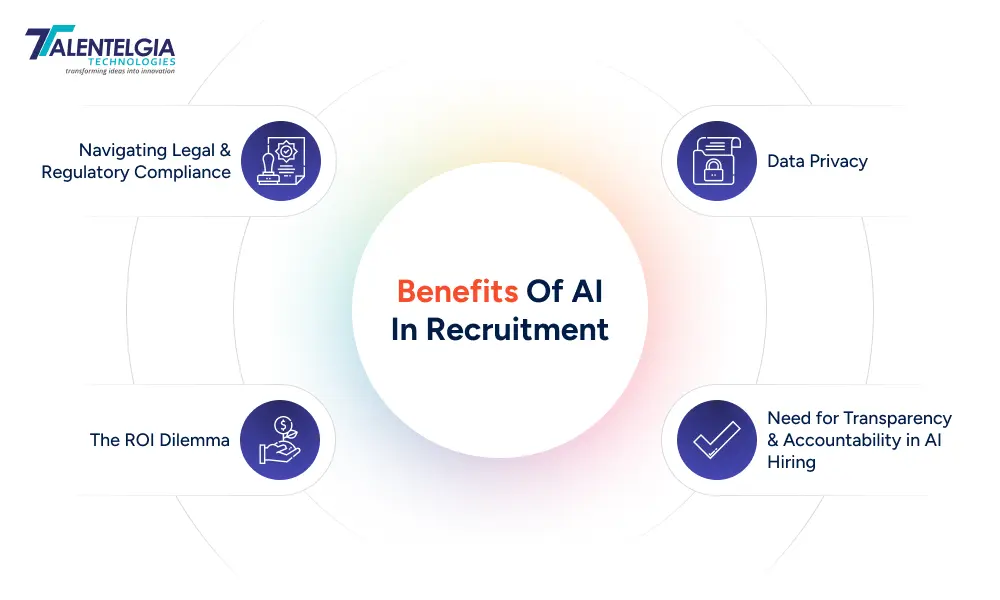
1. Resume Screening
You no longer need to spend 20–40 hours manually reading through 2,000 resumes. It’s 2025, and AI has finally made early-stage hiring faster, more accurate, and fairer. Using machine learning and natural language processing, AI can scan resumes to identify key details like experience, education, and skills. Advanced algorithms then simulate human judgment to shortlist candidates, saving recruiters from the time-consuming task of screening applications around the clock.
The Potential of AI in the Resume Screening:
Quicker hiring: AI can review thousands of resumes in minutes, great for big companies or jobs with high volume.
Better matches: By understanding context (as opposed to keywords), AI is able to make better candidate-role matches.
Decreased bias: Tools are designed to emphasize skills and data, not resume formatting or unconscious preferences.
Real-World Impact:
Companies like HireVue and Pymetrics work to surface eligible candidates that could get overlooked in a manual review, especially those with varied backgrounds or transferable skills.
A Balanced Approach:
But while A.I. is a time-saver, it’s not infallible. If it learns from biased data, though, it can also make the same mistakes that a human can make. That’s why the smartest companies mix AI tools with human judgment to make smarter, fairer choices.
2. AI-Powered Bots
In the current rapidly changing recruiting world, AI interview bots are assuming the role of the first point of contact for candidates, especially in pre-screening and first-round interviews.
AI-powered recruitment bots ask a series of preset, job-relevant questions to assess a candidate’s qualifications, communication style, and cultural fit. While they aren’t meant to replace deep, human-led interviews, they do gather quick, targeted responses that are tailored to the role. The best part? These bots do it fast, consistently, and without bias, helping recruiters make informed decisions early in the process.
Why AI Bots Are Having a Moment in Interviews:
Consistency: Each candidate is asked the same questions, which provides a fair and consistent interview experience.
Bias Reduction: Bots are all about the data – they don’t notice how you look, sound, or tilt your head.
Scalability: Companies can have hundreds of screenings at a time without an increase in recruiter workload.
AI interview bots aren’t replacing human recruiters, but are making early-stage screening more efficient so that hiring teams can spend their time with high-quality, highly likely candidates.
3. AI for background checks
Background checks are something that needs to be done, but also something that takes up unnecessary time and can be quite redundant, not to mention rife with human error. AI-powered background screening tools are what’s changing the game for recruiters and making them able to vet candidates’ information faster, more reliably, and in a non-discriminatory manner than ever before.
And once the AI is wired into the system, it can crawl through everything from an applicant’s employment history, education, and criminal record — sometimes even their social media footprint, where relevant — flagging discrepancies or issuing reports in a fraction of the time the task would take a human.
How AI Upgrades Background Checks:
- Speed & Accuracy: As we’ve seen, AI tools like Checkr and HireRight can conduct checks in minutes, and so, rather than making ad-hoc decisions, more definitive decisions are often made in hours, not days.
- Impartial Decisions: AI systems do not make decisions based on names, locations, or appearances, and so can be less biased and more objective than human judgment.
- High-Volume Hiring: Onboarding 5 or 500 team members, and AI ensures it’s super fast, easy, and consistent.
Real-World Example:
One Checkr case study describes how retail logistics and warehouse-hiring spikes during peak seasons are handled more efficiently via their AI tools, sifting applications faster, automating document workflows, and quickly flagging applicant discrepancies. While the specific company wasn’t named in the public version, the scenario you shared closely mirrors such Checkr-based seasonal warehouse hiring implementations
4. AI In Employee Onboarding
First impressions are everything, especially with onboarding. A good onboarding experience can greatly improve new hire retention and performance. That’s where onboarding tools driven by AI are upending the game.
AI can power automatic, tailor-made journeys from start to finish of onboarding, letting new hires work at their own pace and putting the brakes on HR forgetfulness. From scheduling training modules and dispensing surveys to monitoring comprehension, AI guarantees all onboarding is efficient and timely.
How AI Elevates Onboarding:
- Self-directed Learning: Based on the employee’s role, experience, and performance, AI platforms suggest and plan learning resources to be consumed as per the need.
- Learning loops: Quizzes, surveys, and knowledge checks provide insight into whether the new hire needs more information.
- Task Automation: Leena AI, Talmundo, and Workday are systems that manage document requests, submit policies, and track workflow. This enables the employees to take care of non-repetitive tasks.
Real-World Example:
Ramp-up time reduced by 40% for a mid-sized SaaS company that used an AI assistant to help new employees complete training modules, compliance tasks, and answer FAQs. Feedback scores too, went up: Employees reported that their onboarding was more structured, less overwhelming.
5. AI For Personalization
AI personalization in recruiting means using artificial intelligence to tailor experiences, communication, and recommendations for each candidate based on their unique profile, behavior, and preferences, at every stage of the hiring journey.
In the recruiting use case, AI can enhance the candidate experience with accounts showing job recommendations, company content, or role information based on browsing history, skills, and interests, much in the same way that Netflix suggests movies.
For workers, AI doesn’t stop there when it comes to creating value after a hire. Custom learning and development paths, AI tools like Degreed, EdCast, and Gloat curate content to help forge individual paths to success and long-term growth.
Why AI-Driven Personalization Matters:
- Improved candidate experience: With tailored job recommendations, drop-offs are reduced and application conversions increased.
- Empowering the workforce: Focus on individualistic career growth for motivation, learning, and retention.
- Scale the impact: AI provides HR teams with the ability to provide a personal touch at scale to thousands, without strapping them with manual work.
Benefits Of AI In Recruitment
As companies aim to hire smarter, faster, and more inclusively, Artificial Intelligence is proving to be a game changer. With AI resume screening, a key area where AI is disrupting recruitment, from enhancing the candidate experience to decreasing unconscious bias, AI is changing every aspect of recruiting. Let’s delve into the main benefits that are making AI a strategic hiring advantage in today’s hiring space:
1. AI for Bias Reduction in Hiring
Unconscious bias in hiring has always been an issue with traditional recruitment, but not with AI-powered hiring tools. When integrations are designed and trained responsibly, AI can enable organizations to develop fairer, more inclusive hiring practices based on data and merit alone.
By developing neutral, inclusive job descriptions and screening for skills and experience (not personal characteristics), AI enables recruiters to tap a wider, more divergent talent pipeline. Well-trained A.I., unlike human beings, does not, in state-of-the-art systems like my own, have an opinion or weigh the gender or race or age, or other irrelevant factors.
Key Benefits:
- Objective screening: AI screens candidates by their qualifications and performance, not biases.
- Inclusive job ads: AI tools such as Textio can assist in wording your job advertisements in a way that speaks to a wide variety of demographics.
- Increased reach: AI platforms suggest roles to candidates who could be off the table with traditional filters.
2. Enhancing Candidate Experience with AI
A frictionless hiring experience can either make or break your employer brand, and AI is behind the scenes working to streamline the candidate journey at every step of the way. AI-driven chatbots and intelligent communication platforms are allowing candidates to feel informed, valued, and connected at every stage.
With quick answers, FAQs, and updates directly back to the application in real-time, to scheduling an interview automatically, AI helps to decrease waiting time for the candidate and allows a better view of what’s happening at each stage of the process, so candidates don’t feel disheartened, have to hold their breath, and feel forgotten.
Why This Matters:
- Improved engagement: Applicants who sense they are being led and recognized are more likely to apply and come to interviews.
- Brand perception: Tech-enabled with respect is a good look for company culture.
- Better talent attraction: Happy candidates are more likely to reapply, refer others, or accept the offer.
3. Scalable Recruitment with AI
When companies grow, so does hiring. Manual recruitment efforts, meanwhile, are often unable to keep pace with these kinds of spikes in hiring demands, but recruitment tools that leverage AI can.
AI allows businesses to filter through 1000s of applications at one time, using keywords to select suitable candidates quickly and efficiently. Be it rapid growth or seasonal hiring peaks, with AI, your recruitment engine continues to run smoothly, even when your hiring volumes pick up.
Key Benefits:
- High volume efficiency: AI tools can scale up application scanning and the pre-selection process in minutes.
- Sustainable growth: Faster time-to-hire and less manual work translate to lower overall hiring costs.
- Agility: Act fast on turnover or expansion requirements with a system that is designed to grow.
4. Cutting Recruitment Costs with AI
Of course, hiring the right people is essential, but doing so manually can be time-intensive and costly. That’s where AI recruitment tools help businesses to save both time and money.
Tasks like resume screening, interview scheduling, and candidate communication can be automated with AI, cutting back significantly on the manual process. This can reduce time-to-fill while also decreasing expensive mis-hires by enhancing decision quality through data-driven insights.
How AI Makes Things Cheaper:
- Less administrative overhead: More automated work equals less time for HR staff.
- Quick time-to-hire: Fill positions faster and minimize downtime and project delays.
- Better hiring: Lower your turnover and the cost of rehiring with candidates who are hired based on actual skills and fit.
Challenges Of AI In Recruitment
While AI brings speed, scalability, and smarter decision-making to hiring, it’s not without its complexities. From ethical concerns to financial constraints, organizations must navigate a range of challenges to use AI effectively and responsibly.
Let’s explore some of the most pressing concerns that come with adopting AI in recruitment:
1. Data Privacy
AI speeds and automates hiring, but it also presents a key challenge: data privacy. AI-powered recruitment systems analyze huge amounts of sensitive personal data — resumes, job history, evaluations, and even behavioral information.
It raises legitimate concerns about how candidate data is gathered, saved, and utilized. Employers need to invest in recruitment platforms that meet global privacy standards and are also ethical.
Why Privacy Protection Matters:
- Trust & Transparency: Candidates are more likely to apply when they feel their data is safe.
- Compliance: Mishandling personal data can result in legal and reputational damage.
- Fair hiring: Strong data governance helps AI systems, decisions, and the data behind those decisions stay ethical and NOT be used in an unethical manner.
2. Navigating Legal and Regulatory Compliance
As AI continues to infiltrate the hiring process, adherence to employment laws and anti-discrimination regulations is not a choice; it is mandatory. From the US Equal Employment Opportunity Commission to the AI Act in Europe, new frameworks are emerging to govern fairness, transparency, and accountability in automated hiring systems.
AI use in organizations should be audited regularly to make sure that its data is used properly and that the algorithms are unbiased, and not in danger of violating any labor law, human rights, or other relevant laws.”
Why It’s Critical:
- Mitigate legal risk: Non-compliance can result in a lawsuit, a fine, or public wrath.
- Protect your brand: Transparent, fair processes will strengthen your reputation as an ethical organization.
- Create AI pipelines that are ethical: Make AI tools explainable, auditable, and enable compliance with changing regulations.
3. Need for Transparency and Accountability in AI Hiring
AI can make recruiting more efficient, but decisions that feel like a “black box” can lead to confusion and suspicion. Candidates and even employers may not be completely sure about why people are, or are not, shortlisted, which obviously leads to questions of fairness and reliability.
To be fair and honest in hiring, businesses need their AI systems to have a good helping of explainability and accountability. That includes defining how algorithms are deciding and continuing to have human oversight in the process.
Why It Matters:
- Create trust: An open process demonstrates to candidates that evaluations are just an objective.
- Promotes ethical hiring: The use of explicit AI-based logic can make it possible to identify and address any bias before it has an impact on the results.
- Compliance readiness: Explainable AI is key to staying compliant with global AI and labor laws.
4. The ROI Dilemma
AI is supposed to transform recruiting, but for some employers, the big question is whether it delivers real ROI.
The ROI of AI in hiring is often undercut by high upfront costs, like buying advanced platforms, training teams, and keeping up with evolving compliance rules .And for organizations with limited hiring budgets, it’s understandable to wonder if AI adoption is a well-prepared advance or a costly experiment.
In the meantime, manual recruiting still “works,” putting pressure on TA leaders to justify the move when the bootstrapping can’t be justified.
What You Can Do:
- Just remember that hiring has changed a lot, especially as competition uses automation to identify talent quickly and more narrowly.
- For specific recruiting tasks, look into more scalable or accessible AI options like ChatGPT or Microsoft Copilot before committing to an enterprise-level solution.
- Look at the long game, AI shortens time-to-hire, enhances candidate experience, and creates higher quality-of-hire, which over time pays for itself.
Quick Read: How AI Is Streamlining Resume Screening?
Top 5 AI Recruitment Tools In 2025
In today’s competitive hiring landscape, where time is of the essence, AI recruitment tools are changing the face of how companies source, screen, and engage talent. As a startup or company, these AI-powered platforms are designed specifically to help you hire faster, hire with increased accuracy, and hire smarter. Below are the top 5 AI recruitment tools in 2025 that are leading the way.
1. Workable
Workable is an all-in-one AI-driven recruitment software that enables HR teams to manage their complete hiring process, from advert to offer, all in one place. Small- and mid-sized businesses love it for its easy interface, smart automation, and extra features like AI-generated job descriptions, candidate screening, and salary benchmarking. With more than 30,000 companies already on board, Workable has emerged as a preferred choice for hiring that is effective, methodical, and data-driven.
Pros
- AI job description writer with tone, version control
- UK/US Salaries estimate based on real-time market data
- AI Screening Assistant for candidate fit ranking and summarizing
- AI video interviews and AI Recruiter passive sourcing are built in
- 290+ integrations, plus open API for seamless workflow integration
Cons
- Extra charges for texting, video, transcription, and salary tools
- Sourcing is not as extensive as some of the specialized tools
- No chatbot for candidate communication.
Is Workable Worth It?
Definitely — for small-to-medium teams looking to do smart, scalable hiring. Workable’s AI tools are more robust than mere automation. It has one of the best job post generators we’ve tested, with editable tones and sentence-level customization. The Salaries Estimator helps you keep pace with the talent market.
Its AI-Recruiter is not as sophisticated as some of the most advanced sourcing tools like Fetcher, but it’s a good in-house option for leaner teams. We also liked the AI Screening Assistant — a tool that made shortlisting candidates easy, with scores and summaries custom-fit to the role.
2. Paradox
Paradox is an AI recruitment platform best known for its virtual hiring assistant, Olivia, which automates candidate interactions through conversational chat. It’s built to streamline high-volume hiring for large enterprises.
The part that impressed us the most was their seamless onboarding process and very responsive support. Olivia can speak with candidates in 100+ languages, making it easy to communicate, answer questions automatically, and take some work off the recruiter’s plate. It’s not a full human replacement, but Paradox pushes conversational AI into the forefront of today’s recruitment process.
Pros
- Reduces repetitive communication for recruiters
- Strong implementation and onboarding support
- Conversational AI supports 100+ languages
- Backend UI is responsive (14 screens) and multilingual (30+ languages)
Cons
- Customizations can be slow to implement
- Olivia could use some recruiter help with more difficult questions
- Not all issue resolutions are tested before handing over
- No free trial or public list of pricing; quote-based only demos
Is Paradox Worth It?
Paradox is something to consider for bigger corporations needing to make high volumes of hires year-round. The company’s AI assistant, Olivia, can engage with candidates 24 hours a day, fielding questions, prompting them to submit their résumés, and setting up interviews, freeing up recruiters’ time and mental energy. It can’t replace human judgment, but it’s a huge time-saver in the early stages of hiring and a boon to scaling recruiting.
3. WellFound
Wellfound (Formerly AngelList Talent) Wellfound is a hiring platform designed for startups & tech companies. It provides AI-enabled sourcing with its RecruiterCloud module and features a complimentary applicant tracking system (ATS) for end-to-end hiring management.
Pros:
- AI-powered sourcing from 10M+ in-house candidates and 500M+ external profiles.
- RecruiterCloud Autopilot allows hands-free candidate sourcing with human review.
- Self-Serve option gives full control over candidate outreach and screening.
- Free built-in ATS with unlimited job postings, team collaboration, and scheduling.
- AI tagging highlights top candidate strengths instantly.
Cons:
- No mobile app for on-the-go access.
- Limited to tech-focused roles; not ideal for general or non-tech hiring.
- Basic analytics and limited integrations compared to enterprise tools.
- Lacks broader HR features like onboarding, performance tracking, or employee experience tools.
Is WellFound Worth It?
If you are a startup or SMB looking to hire for tech-focused roles such as product, engineering, or growth. The fusion of AI sourcing and human curation allows for highly relevant candidates. But isn’t really robust for big corps or non-tech hiring.
4. BrainTrust
Braintrust is an AI interviewing system that interviews candidates through a voice-based conversation in real time. The platform’s AI engine, dubbed AIR, screens candidates, follows up with questions, rates interviews, and then delivers recruiter-ready shortlists, automating and injecting intelligence into the initial screening process.
Pros:
- AI voice interviews in real-time with adaptive follow-up questions.
- Low-bias design does not include any personal identifiers in the rating.
- Facilitates interviews for your global hiring in 10+ languages.
- Results of the Interview are displayed on an intuitive recruiter dashboard.
Cons:
- No sourcing tools — does not help find candidates, only screens.
- ATS functionality is simple and is more effective when used with integrations.
- No automated re-engagement; Former candidates will NOT be re-engaged without manual follow-up.
Is Braintrust worth it?
Yes — Braintrust makes a lot of sense for businesses that need to process a high number of applications and need to do some baseline screening. Its AI-engaged conversations stimulate an authentic interview, screen at the top of the funnel, and lighten the load on the recruiter’s end. But, it is important to note that it lacks sourcing tools and full-blown ATS capabilities.
5. hireEZ
hireEZ (formerly Hiretual), is a leading recruiting platform for next-gen teams. It provides automation around sourcing, candidate engagement, and analytics to enable mid-to-large employers to recruit faster and at scale.
Pros:
- AI sourcing & engagement tools for proactive recruiting.
- Smart candidate recommendations via daily email updates.
- Automated email sequences improve outreach efficiency.
- Easy-to-use dashboard and clean UI.
- Supports diversity hiring filters (gender, race, etc.).
- Browser extension and dedicated customer support.
Cons:
- Inaccurate or outdated contact info reported by some users.
- Limited integration with LinkedIn.
- No transparent pricing or free trial.
Is hireEZ worth it?
Yes — hireEZ is a good fit for organizations with high-volume or unique hiring needs. Its AI-powered sourcing and automatic outreach are time-saving and help expedite hiring. But some infrequent inconsistencies and bad LinkedIn support can hold it back in certain workflows.
Conclusion
AI in hiring is now not just a thing of the future but the present that is transforming the way companies search and hire staff. With skill-based assessments, chatbots, automation, and even avatar-led interviews, AI is making the process of hiring faster, fairer, and more efficient for both recruiters and job seekers. With the war on top talent heating up, those companies that embrace these AI-enabled tools will not only gain a strategic advantage but will also develop more inclusive, data-driven hiring practices that attract top-tier performers and enhance long-term retention.


 Healthcare App Development Services
Healthcare App Development Services
 Real Estate Web Development Services
Real Estate Web Development Services
 E-Commerce App Development Services
E-Commerce App Development Services E-Commerce Web Development Services
E-Commerce Web Development Services Blockchain E-commerce Development Company
Blockchain E-commerce Development Company
 Fintech App Development Services
Fintech App Development Services Fintech Web Development
Fintech Web Development Blockchain Fintech Development Company
Blockchain Fintech Development Company
 E-Learning App Development Services
E-Learning App Development Services
 Restaurant App Development Company
Restaurant App Development Company
 Mobile Game Development Company
Mobile Game Development Company
 Travel App Development Company
Travel App Development Company
 Automotive Web Design
Automotive Web Design
 AI Traffic Management System
AI Traffic Management System
 AI Inventory Management Software
AI Inventory Management Software
 AI Software Development
AI Software Development  AI Development Company
AI Development Company  AI App Development Services
AI App Development Services  ChatGPT integration services
ChatGPT integration services  AI Integration Services
AI Integration Services  Generative AI Development Services
Generative AI Development Services  Natural Language Processing Company
Natural Language Processing Company Machine Learning Development
Machine Learning Development  Machine learning consulting services
Machine learning consulting services  Blockchain Development
Blockchain Development  Blockchain Software Development
Blockchain Software Development  Smart Contract Development Company
Smart Contract Development Company  NFT Marketplace Development Services
NFT Marketplace Development Services  Asset Tokenization Company
Asset Tokenization Company DeFi Wallet Development Company
DeFi Wallet Development Company Mobile App Development
Mobile App Development  IOS App Development
IOS App Development  Android App Development
Android App Development  Cross-Platform App Development
Cross-Platform App Development  Augmented Reality (AR) App Development
Augmented Reality (AR) App Development  Virtual Reality (VR) App Development
Virtual Reality (VR) App Development  Web App Development
Web App Development  SaaS App Development
SaaS App Development Flutter
Flutter  React Native
React Native  Swift (IOS)
Swift (IOS)  Kotlin (Android)
Kotlin (Android)  Mean Stack Development
Mean Stack Development  AngularJS Development
AngularJS Development  MongoDB Development
MongoDB Development  Nodejs Development
Nodejs Development  Database Development
Database Development Ruby on Rails Development
Ruby on Rails Development Expressjs Development
Expressjs Development  Full Stack Development
Full Stack Development  Web Development Services
Web Development Services  Laravel Development
Laravel Development  LAMP Development
LAMP Development  Custom PHP Development
Custom PHP Development  .Net Development
.Net Development  User Experience Design Services
User Experience Design Services  User Interface Design Services
User Interface Design Services  Automated Testing
Automated Testing  Manual Testing
Manual Testing  Digital Marketing Services
Digital Marketing Services 
 Ride-Sharing And Taxi Services
Ride-Sharing And Taxi Services Food Delivery Services
Food Delivery Services Grocery Delivery Services
Grocery Delivery Services Transportation And Logistics
Transportation And Logistics Car Wash App
Car Wash App Home Services App
Home Services App ERP Development Services
ERP Development Services CMS Development Services
CMS Development Services LMS Development
LMS Development CRM Development
CRM Development DevOps Development Services
DevOps Development Services AI Business Solutions
AI Business Solutions AI Cloud Solutions
AI Cloud Solutions AI Chatbot Development
AI Chatbot Development API Development
API Development Blockchain Product Development
Blockchain Product Development Cryptocurrency Wallet Development
Cryptocurrency Wallet Development About Talentelgia
About Talentelgia  Our Team
Our Team  Our Culture
Our Culture 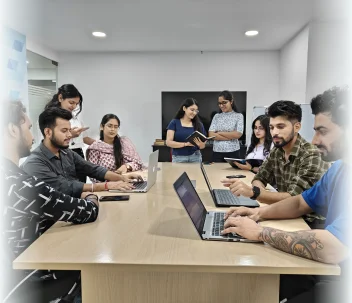
 Healthcare App Development Services
Healthcare App Development Services Real Estate Web Development Services
Real Estate Web Development Services E-Commerce App Development Services
E-Commerce App Development Services E-Commerce Web Development Services
E-Commerce Web Development Services Blockchain E-commerce
Development Company
Blockchain E-commerce
Development Company Fintech App Development Services
Fintech App Development Services Finance Web Development
Finance Web Development Blockchain Fintech
Development Company
Blockchain Fintech
Development Company E-Learning App Development Services
E-Learning App Development Services Restaurant App Development Company
Restaurant App Development Company Mobile Game Development Company
Mobile Game Development Company Travel App Development Company
Travel App Development Company Automotive Web Design
Automotive Web Design AI Traffic Management System
AI Traffic Management System AI Inventory Management Software
AI Inventory Management Software AI Software Development
AI Software Development AI Development Company
AI Development Company ChatGPT integration services
ChatGPT integration services AI Integration Services
AI Integration Services Machine Learning Development
Machine Learning Development Machine learning consulting services
Machine learning consulting services Blockchain Development
Blockchain Development Blockchain Software Development
Blockchain Software Development Smart contract development company
Smart contract development company NFT marketplace development services
NFT marketplace development services IOS App Development
IOS App Development Android App Development
Android App Development Cross-Platform App Development
Cross-Platform App Development Augmented Reality (AR) App
Development
Augmented Reality (AR) App
Development Virtual Reality (VR) App Development
Virtual Reality (VR) App Development Web App Development
Web App Development Flutter
Flutter React
Native
React
Native Swift
(IOS)
Swift
(IOS) Kotlin (Android)
Kotlin (Android) MEAN Stack Development
MEAN Stack Development AngularJS Development
AngularJS Development MongoDB Development
MongoDB Development Nodejs Development
Nodejs Development Database development services
Database development services Ruby on Rails Development services
Ruby on Rails Development services Expressjs Development
Expressjs Development Full Stack Development
Full Stack Development Web Development Services
Web Development Services Laravel Development
Laravel Development LAMP
Development
LAMP
Development Custom PHP Development
Custom PHP Development User Experience Design Services
User Experience Design Services User Interface Design Services
User Interface Design Services Automated Testing
Automated Testing Manual
Testing
Manual
Testing About Talentelgia
About Talentelgia Our Team
Our Team Our Culture
Our Culture
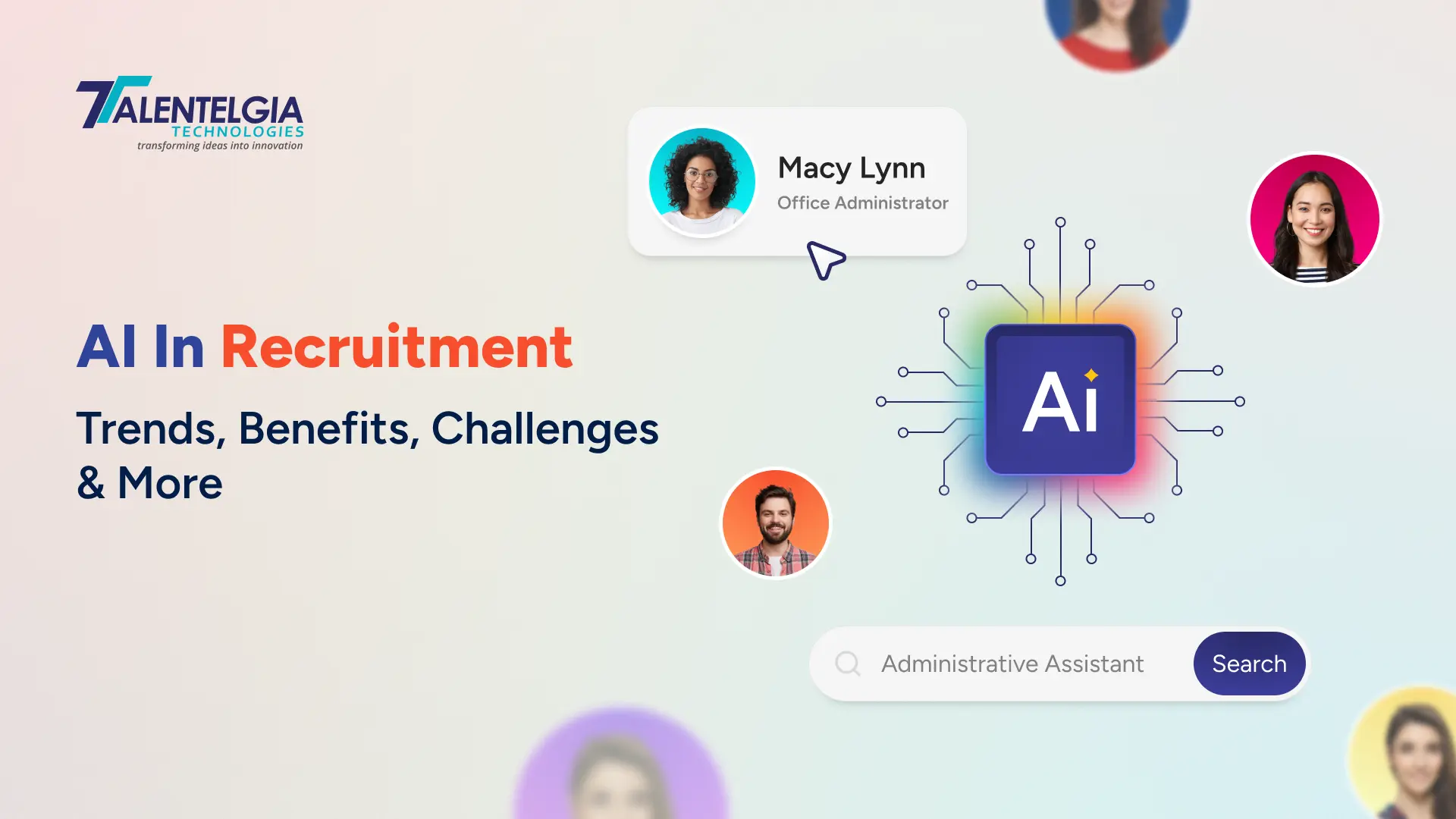
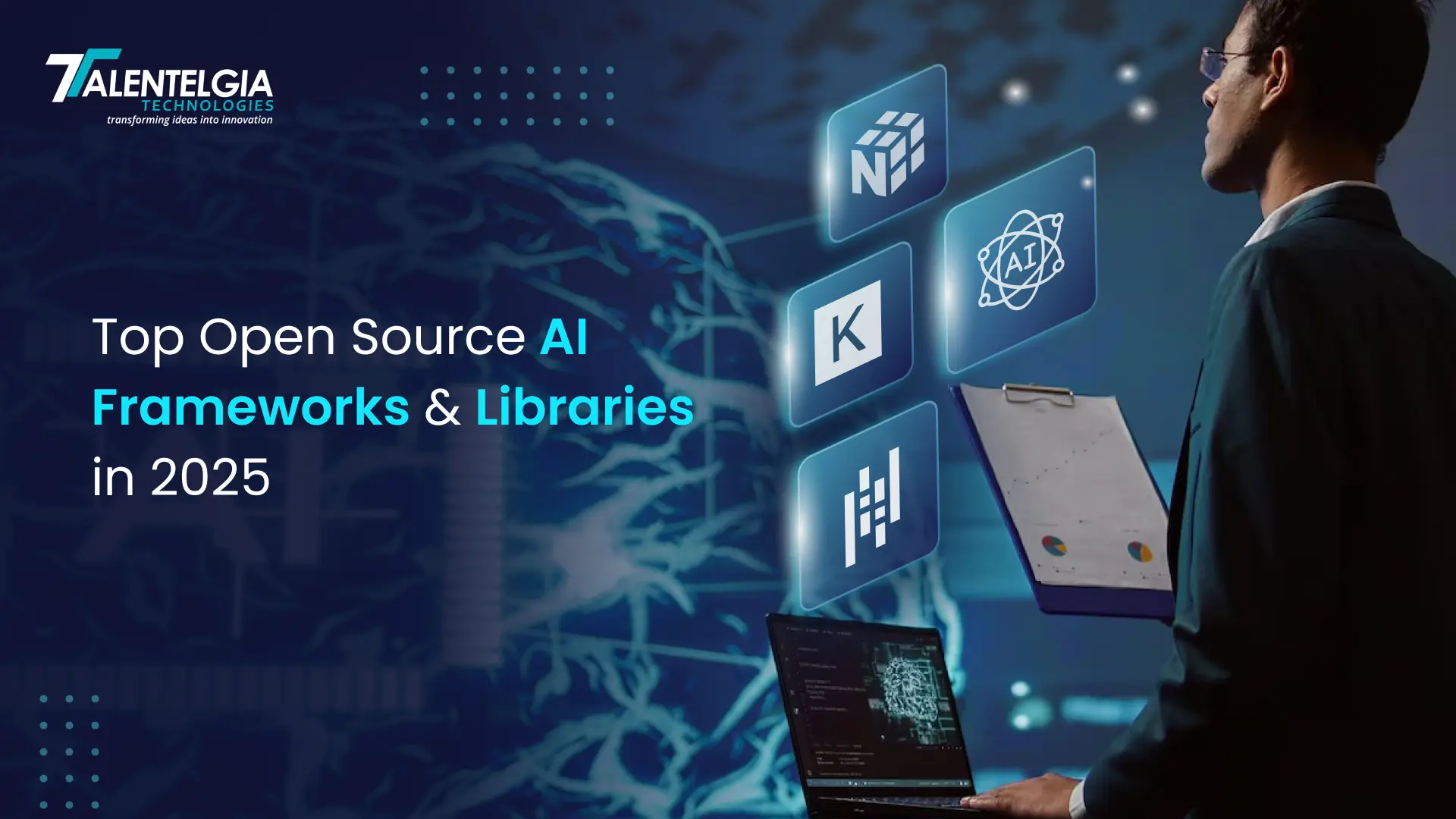

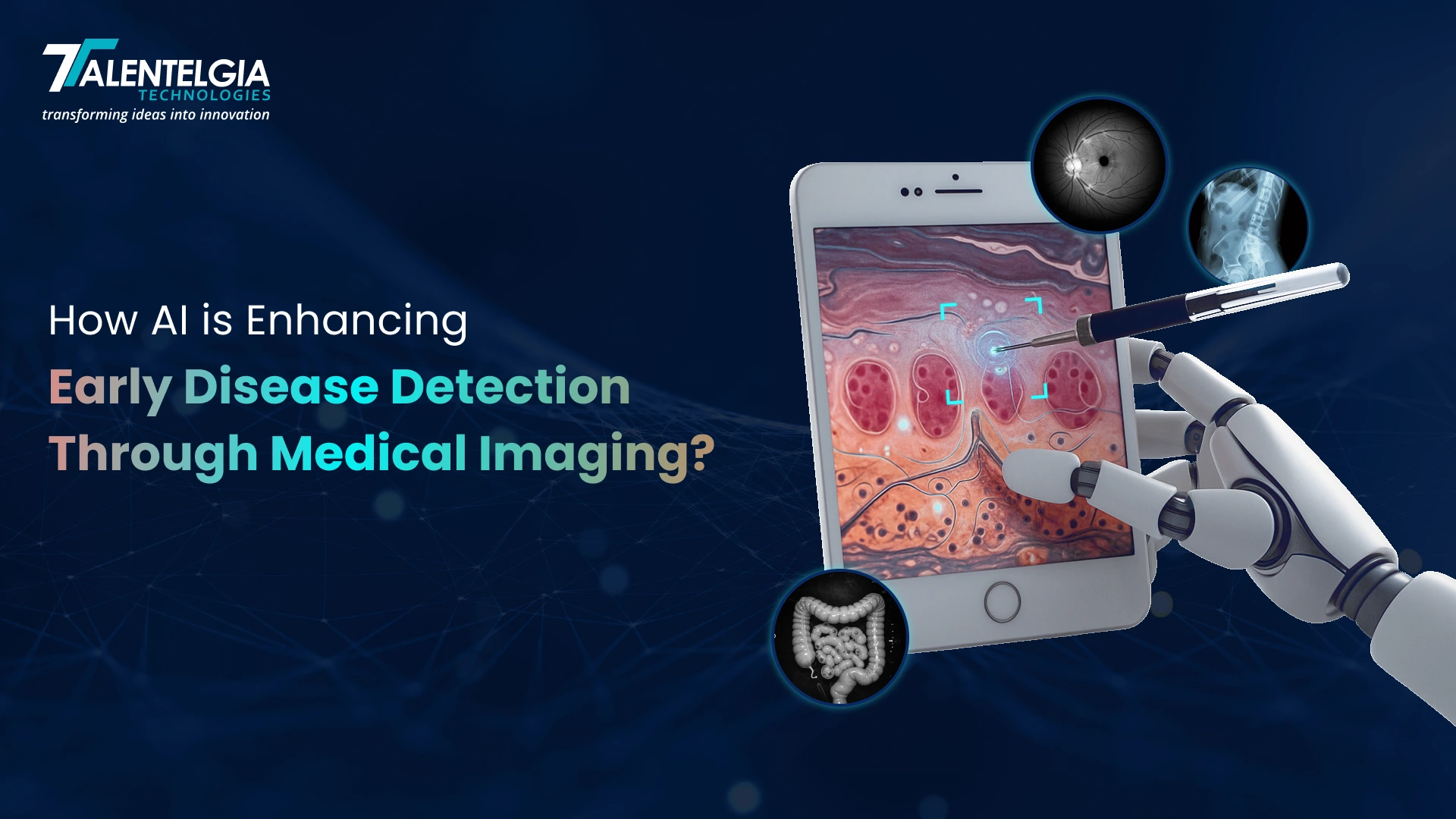

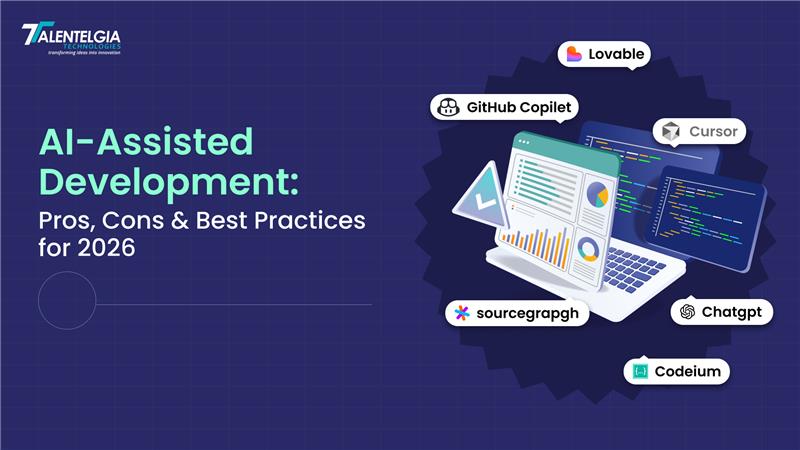











 Write us on:
Write us on:  Business queries:
Business queries:  HR:
HR: 





